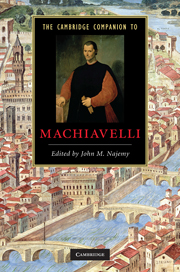Book contents
- Frontmatter
- Introduction
- 1 Niccolò Machiavelli: a portrait
- 2 Machiavelli in the chancery
- 3 Machiavelli, Piero Soderini, and the republic of 1494-1512
- 4 Machiavelli and the Medici
- 5 Machiavelli’s Prince in the epic tradition
- 6 Society, class, and state in Machiavelli’s Discourses on Livy
- 7 Machiavelli’s military project and the Art of War
- 8 Machiavelli’s Florentine Histories
- 9 Machiavelli and Rome: the republic as ideal and as history
- 10 Philosophy and religion in Machiavelli
- 11 Rhetoric and ethics in Machiavelli
- 12 Machiavelli and poetry
- 13 Comedian, tragedian: Machiavelli and traditions of Renaissance theater
- 14 Machiavelli and gender
- 15 Machiavelli’s afterlife and reputation to the eighteenth century
- 16 Machiavelli in political thought from the age of revolutions to the present
- Index
11 - Rhetoric and ethics in Machiavelli
Published online by Cambridge University Press: 28 September 2010
- Frontmatter
- Introduction
- 1 Niccolò Machiavelli: a portrait
- 2 Machiavelli in the chancery
- 3 Machiavelli, Piero Soderini, and the republic of 1494-1512
- 4 Machiavelli and the Medici
- 5 Machiavelli’s Prince in the epic tradition
- 6 Society, class, and state in Machiavelli’s Discourses on Livy
- 7 Machiavelli’s military project and the Art of War
- 8 Machiavelli’s Florentine Histories
- 9 Machiavelli and Rome: the republic as ideal and as history
- 10 Philosophy and religion in Machiavelli
- 11 Rhetoric and ethics in Machiavelli
- 12 Machiavelli and poetry
- 13 Comedian, tragedian: Machiavelli and traditions of Renaissance theater
- 14 Machiavelli and gender
- 15 Machiavelli’s afterlife and reputation to the eighteenth century
- 16 Machiavelli in political thought from the age of revolutions to the present
- Index
Summary
“I have not adorned this work nor filled it with long periodic sentences or pompous and magnificent words or any of the other elegant niceties and superficial ornaments with which many writers like to adorn and elaborate their matter; for it was my intent that it should either be entirely unembellished, or that the variety of the argument and the weightiness of the subject matter should alone constitute its appeal.” Machiavelli's scornful dismissal of verbal ornament in the dedicatory letter of The Prince can look to modern eyes like a rejection of “rhetoric,” in the reductive sense that word is often given today, namely, overripe verbal bombast. Within Machiavelli's culture, however, rhetoric was understood in a broader and more positive sense as a comprehensive practice of persuasion, embracing the conceptual as well as the verbal, and as an art with a particular political vocation. Machiavelli's writings are heavily indebted to this rhetorical tradition, not only for the form in which they cast their arguments, but also for their substance. We might even describe political practice, in the distinctive way Machiavelli frames it, as a creative adaptation of rhetoric. In Machiavelli's Florence, as in the classical world, rhetoric offered a sophisticated model for a complex, power-oriented civic practice: power-oriented in the sense that the orator's mission was to mold his listeners' responses and work on their wills. Machiavelli's genius lies in the transformative political use he proposes for this practice. His, however, is an innovation with long historical roots.
- Type
- Chapter
- Information
- The Cambridge Companion to Machiavelli , pp. 173 - 189Publisher: Cambridge University PressPrint publication year: 2010
- 8
- Cited by

